Please use the following link to download the May 6, 2023 issue of the syəcəb
Marvin Nobe Smith
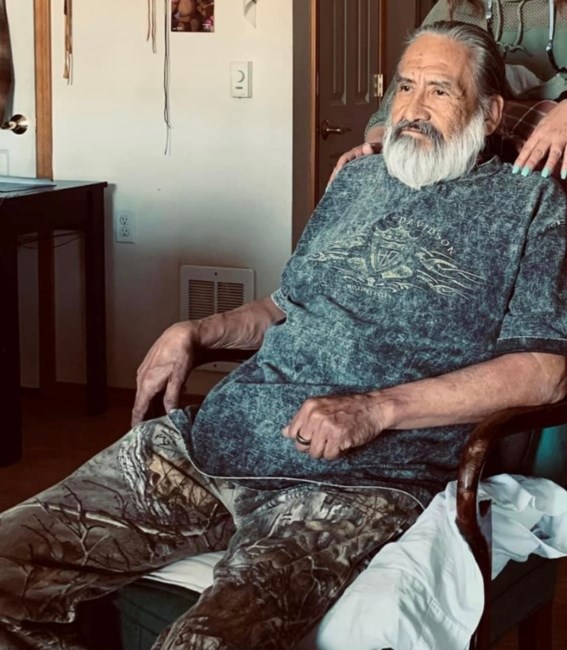
DECEMBER 29, 1949 – APRIL 29, 2023
Marvin Nobe smith of the Nex-Perce Tribe residing in Tulalip,
was born December 29 1949 to jack Smith and Irene Scott and passed away April 29 2023 Marvin Nobe Smith was a brilliant man that had mastered in fishing and hunting He never hesitated to help his fellow Fisherman with hanging their nets, fixing their boats and motors He also enjoyed the outdoors such as hunting and camping with his wife and two sons Merle hayes and Carnegie hayes along with numerous grandchildren and nephews He and his wife enjoyed spending time with the senior program going on trips and attending bingo day He’s survived by his wife April Smith, his daughter Paulette Smith, and Bernadette Hayes, siblings Janice Smith, Anna Ziegler, Elizabeth Murillo, Adrian Ziegler, numerous grandchildren, special nieces and nephews great grandchildren.
An evening service will be held Thursday, May 4, 2023 at 6:00 PM at the Tulalip Gathering Hall. A celebration of his life will be held Friday at 10:00 AM at the Tulalip Gathering Hall with burial to follow at Mission Beach Cemetery. Arrangements entrusted to Schaefer-Shipman Funeral Home.
Waking the canoes
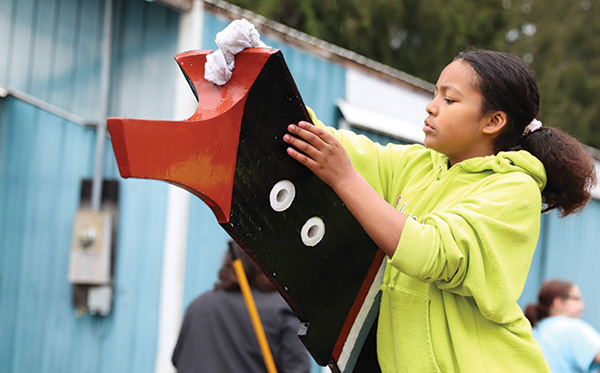
By Kalvin Valdillez
“The canoes have their own spirits because they were living trees at one point,” said Tulalip Skipper, Taylor Henry. “Waking them up is part of that spiritual connection between us and them. It’s literally opening their eyes – because the circles on the canoe head are their eyes.”
One by one, the three Tulalip canoes were carefully hitched to the back of a pickup truck and removed from their designated resting place, at the canoe shed behind the Tulalip Veterans Park, on the evening of May 1. Placed side-by-side at the center of the park, the black and red cedar dugouts were a majestic sight to behold. They radiated with a spiritual energy that was felt by all tribal members in attendance who gathered for the annual canoe cleansing, a special tradition that has been passed through the generations.
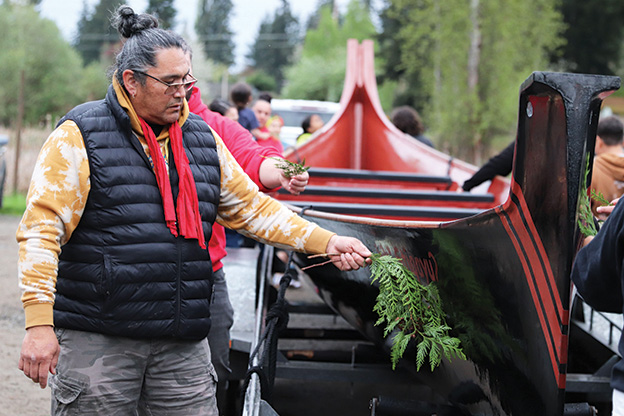
With the coming of springtime and the promise of an eventful summer, which includes Canoe Journey and Spee-Bi-Dah, the canoes were called upon by the sduhubš people to return to their ancestral highways, also known as the Salish Sea, to help the people celebrate and engage in the traditions of the Tribe.
Armed with soapy buckets of water and wash cloths, the people began to gently awaken the spirits of Little Sister, Big Sister, and Big Brother by thoroughly scrubbing every inch of the canoes. Tribal youth accounted for over half of those in attendance at the cleansing. The kids listened to instructions intently and took the task at-hand very seriously as they knew the importance of the work that they were conducting.
Tribal youth, Thomas Wenzel, shared, “I feel like it’s hard work, but not too difficult. I did it with a good heart and embraced that work that we did today. I’m excited because I really enjoy canoe practice.”
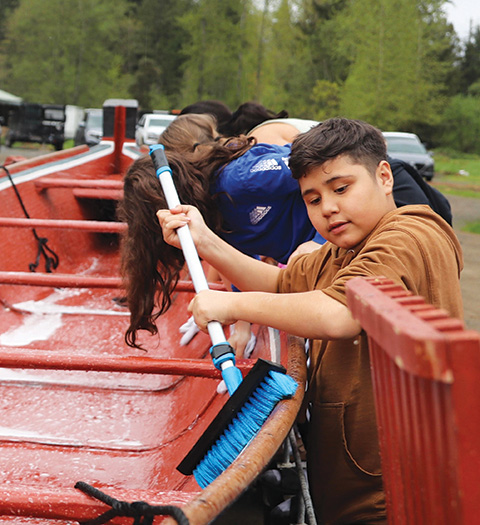
To help build up that canoe puller strength and endurance, the Tribe plans on holding canoe practice once a week until the start of the 2023 Canoe Journey: Paddle to Muckleshoot. For this reason, it’s important that the canoes are awakened in traditional fashion prior to the start of the weekly practices across Tulalip Bay. Canoe practice is not only beneficial to the pullers, but to the canoes themselves in order for them to get reacquainted with the waters and long voyages through unpredictable conditions.
Said Taylor, “Waking them up, it’s like lifting their spirits up, it helps us go smoother on the water. When we take care of them, they take care of us. Today made me feel good, excited to be out on the water, excited to see everybody come together, excited for Canoe Journeys, and to see old friends and families.”
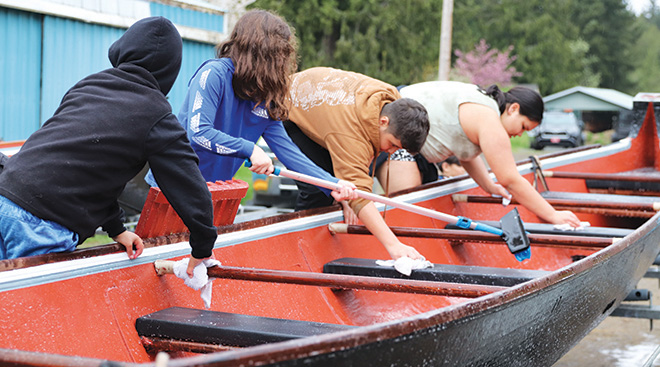
Washing the canoes is only half of the work that takes place at the yearly cleansing event. Once the canoes were restored to their traditional shine, sparkle, and glory, each Tribal member received a cedar branch. Together, the people brushed away any unfavorable energy, emotions, and feelings from the canoes with the medicine of the cedar. The group circled counterclockwise around the canoes four times each, and sang the songs dedicated specifically to Little Sister and Big Sister, and the paddle song to Big Brother.
“We were out here cleaning the canoes and getting them ready for this year’s journey,” stated Tribal member Mike Wenzel. “It’s a cultural connection and something that I like doing. I liked singing and circling the canoes to brush them off and bless them, just keeping the tradition alive.”
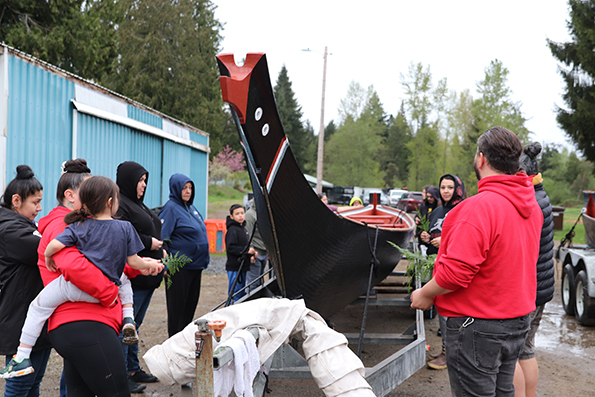
Added Tulalip Skipper, Andrew Gobin, “We brush them off to take anything off of them that may be there from last year, anything that they’re feeling. It feels good to get the canoes washed up and cleaned up, just making sure that they’re in a good place for us as we go out, and they’ll carry us on the water once more and take care of us.”
There are still several weeks before this year’s intertribal Canoe Journey takes place, so if you’re looking to get some reps in, or simply experience the medicine of being out on the water, canoe practice is held at 6:00 p.m. every Wednesday at the Tulalip Marina.
Matika celebrates Project 562 book launch where it all began, with Tulalip high schoolers
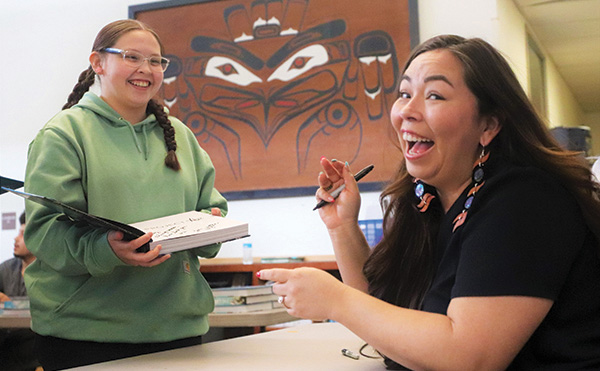
By Micheal Rios, Tulalip News
It’s been over a decade since visual storyteller Matika Wilbur uprooted her life entirely and sold all her material possessions to fully invest in her vision: to photograph the vast beauty and diverse spectrum of Native American culture, unveil the true essence of contemporary Native American issues, and showcase the magnitude of tradition that unites Native America.
She named her vision Project 562. A moniker that reflected the number of federally recognized tribes at the start of her journey back in 2012. There are now 574 federally recognized tribes, yet her intention behind choosing the name Project 562 remains intact as she intended to both inspire and educate.
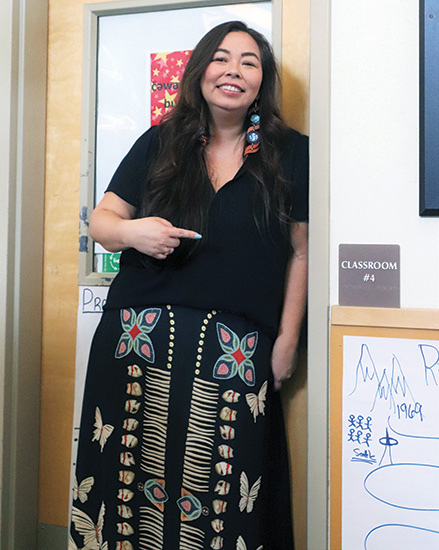
“While teaching at Tulalip Heritage High School and attempting to create a photography curriculum with a narrative that our children deserve, I found an outdated narrative,” she recalled of her journey’s inception. “It’s an incomplete story that perpetuates an American historical amnesia. It’s a story that’s romantic, dire and insatiable…it’s the story of extinction.”
Matika points out the extinction theme often associated with Native America is easily perceived by doing a quick Google Images search. If you search for ‘African American’, ‘Latino American’ or ‘Asian American’, then you will find images of present-day citizens who represent each culture. You’ll also see proud, smiling faces and depictions of happy families.
But if you search for ‘Native American’ the results are very different. You’ll see many black and white photos of centuries old Native Americans who are “leathered and feathered”.
“All of these images and misconceptions contribute to the collective consciousness of the American people, but more importantly it affects us in the ways that we imagine ourselves, in the ways we dream of possibility,” explained the Tulalip citizen turned nationally renowned photographer.
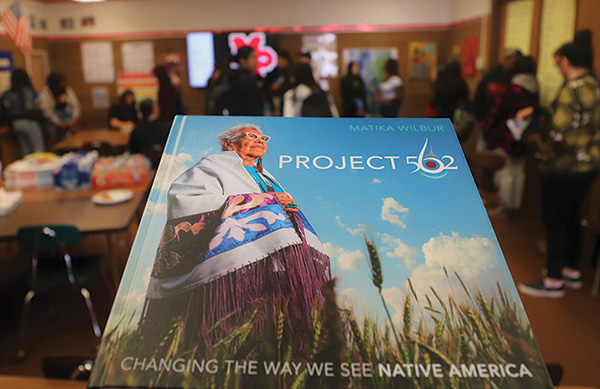
After dedicating the last 11 years, traveling more than 600,000 miles and visiting more than 400 sovereign tribal nations (spanning from the Aleutian Islands of Alaska to the Miccosukee in Florida’s Everglades), Matika has returned home. And with her return came the exciting announcement that she received an exclusive book deal with Ten Speed Press.
While on the road to fulfilling her vision, Matika became one of the Pacific Northwest’s leading photographers and has been exhibited extensively in regional, national, and international venues, such as the Hibulb Cultural Center, Seattle Art Museum, the Burke Museum of Natural History and Culture, The Tacoma Art Museum, the Royal British Columbia Museum of Fine Arts, and the Nantes Museum of Fine Arts in France.
Even more impressively, some of her stunning photos are now included in the Google Images front page when searching ‘Native American’. She’s literally helped change the powerful Google search algorithm to showcase a more modern, vibrantly fierce Native American spirit.

Another momentous experience for her and the local community took place on April 26, when the now 39-year-old Matika presented Native American students of Marysville Getchell, Marysville Pilchuck, and Tulalip Heritage high schools with her crowning achievement – Project 562: Changing The Way We See Native America – a whopping 416-page hardcover book showcasing Native American culture through breathtaking photos and stories from hundreds of tribal nations.
“I set off on this journey to change the way we see Native America. To put together a body of work that represents who we truly are. This journey has taken me across all 50 states, from the Arctic to New Zealand to Puerto Rico to over 1,000 tribal communities in between,” shared the expressive homegrown icon to the Heritage high school students. “All of you are why I did this. Even if I don’t know you personally or you may not know me, it’s so important that you, the children of this community, know how truly loved you are. You are our hopes and our dreams and our future.
“I want you to know that despite what anybody tells you, despite the lies you’ve been told about yourselves, and despite the false narratives written about your ancestors, you deserve all the goodness. You deserve all the medicine. You deserve the opportunity to believe in yourselves. I want you to know that these pages were written for you. Even if you don’t read it immediately or just a little at a time, never forget this book and all its messages within were made for you.

“For me, in this moment, I feel like my dream came true, but I also can’t help but think of all the relatives who didn’t get to see their dreams come true,” she continued. “Hopefully, you too can live to a time where you can see your dreams actualized. If I can leave you all with one final message it’s to dream bigger, imagine bigger…because you deserve it.”
Within her book, which currently ranks #2 on the Amazon Best Sellers list for Art & Photography, are candid conversations about tribal sovereignty, self-determination, holistic wellness, historical trauma, decolonization, rematriation and many more on the importance of revitalizing culture. This creative, consciousness-shifting work is available for purchase locally at the Hibulb Cultural Center and the Elliot Bay Book Company, or through digital purchase via Amazon or Barnes & Noble.
“This book means so much to me because I didn’t even know of her or her journey until the beginning of this year, but I’ve learned through her stories and presentation how much she’s done for our community and many other tribal communities across the country,” shared 9th grader Lilly Jefferson. “I’m so amazed looking at her photos and can’t believe she fulfilled her dream even though no one believed in her in the beginning. I’m really excited for when I grow up and make new dreams because I won’t forget her and what she said. I will dream big!”
“After all her travels and visiting all those other tribes, she still chose to come back home and give back to her community. That’s pretty cool,” added 16-year-old Image Enick. “Listening to her story gives me more inspiration for a dream of mine. I have an idea to create a YouTube channel and document travels to other tribes who play stick games. The game is played different the further you travel, and I’d like to learn how they play in Rocky Boy, Montana and across the border in Canada. Knowing we have a tribal member here who has visited all the tribes, it makes me feel good to think I can approach her with my idea and get tips on who to talk to and where to go when I decide to start my own journey.”
In the most respectful way, Matika estimates she’s been welcomed into a thousand different tribal communities because they not only supported her project whole-heartedly, but also because they too desired to see things change. From media coverage to Google Images search results to what’s written in history books, Native Americans deserve an accurate portrayal of their thriving, dynamic traditions and remarkable oral histories that have sustained Native America since time immemorial.
Sarah Ivarra

October 24, 1985 – Ivarra April 26, 2023
Sarah Ivarra, 37 of Tulalip passed away April 26, 2023 at home.
She was born Oct. 24, 1985 to Gilbert and Myrna Ivarra in Everett, WA. She graduated from high school in 2004. S traveling especially to Texas to see her dad. She enjoyed her Native American culture. Her life revolved around her children, mother, and uncle Cy. She liked her job at the Security Pallet Shelter.
She is survived by her children, Olivia and Daisy; her parents, Gilbert Ivarra, and Myrna Pacheco; her uncle Cy; aunts Marilyn, Juanita, Elizabeth, and Tina; siblings, Travis, David,Christina, Cyrus, Eli, Alicia, Vanessa, Elsa, Gil Jr, and Katelee.
An evening service will be held Tuesday, May 2, 2023 at 6:00 pm at the Tulalip Gathering Hall. A celebration of her life will be held Wednesday, at 10:00 am at the Tulalip Gathering Hall with burial to follow at Mission Beach Cemetery. Arrangements entrusted to Schaefer-Shipman Funeral Home.
Art Festival elevates emerging artists

By Micheal Rios, Tulalip News
Creative inclined Native American students of the Marysville School District wandered through a makeshift art gala that was the Don Hatch Youth Center on Thursday, April 20 for the 2023 Art Festival. Accompanied by their families, friends and educators, the emerging artists ranging from 1st to 12th grade wowed Art Festival patrons and judges with a variety of imaginative creations that centered around a shared Tulalip culture and modern day mediums of artistic expression.
“Our annual Art Festival is an opportunity for each Native student within the District to express themselves in a unique and creative way,” explained positive youth development lead advocate, Deyamonta Diaz. “All the work that goes on behind the scenes to make this event possible, it’s like an all-hands-on-deck effort, is so worth it for our community to witness the pride and joy every student puts into their art.

“Each year our expectations are surpassed because we receive hundreds and hundreds of submissions,” he added. “For me, I look forward to seeing what new ways our kids find to express their Native culture or even developing their own way to retell a traditional story. There’s always something new and eye-catching that they come up with. That’s pretty cool.”
For more than two decades now, Marysville School District has partnered with the Tulalip Tribes to dedicate an evening to the art scene embraced by so many emerging Tulalip artists and other Native students within the District. The Art Festival gives fledgling creatives an opportunity to show off their awe-inspiring talents to the community, while also getting a chance to take home a coveted 1st, 2nd or 3rd place ribbon. Plus, all the bragging rights that come with.

Such was the case with 11-year-old Braiden Kane. He radiated pure joy while leading cousins and classmates to his multiple 3rd place winning submissions. Young Braiden collected three white ribbons for his hand-made cedar headband, seat turtle painting and an alligator habitat structure.
“This was my first time ever creating a cedar headband. My mom took us to culture night and we learned how to make it. Working with cedar felt great and made me feel calm. The sea turtle painting is covered in swirls. The swirl represents my family’s favorite colors,” shared the very happy 5th grader.

Braiden and his fellow student culture bearers were able to win 1st, 2nd or 3rd place, plus honorable mention, in a variety of artistic mediums. Categories included culture, drawing, painting, writing, mixed media, sculpture, digital art, and pure heart. The top four from each grade and category received a ceremonial ribbon recognizing their talents and a monetary prize.
“It was amazing to see just how talented our Native students are. The new ideas and concepts they come up with every year continue to surprise us judges,” shared Art Festival judge Doug Salinas while admiring the middle school painting section. “I think every kid has the capability to be an artist because their imagination has no limits.”
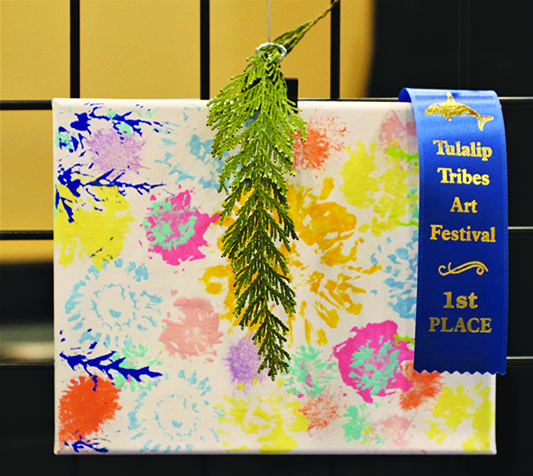
This year’s Art Festival received about 600 submissions, with the most popular category by far being painting. There were many young artists who showed off their diverse talents by submitting artwork in as many categories as they could. In her final year of eligibility, twelfth grader Samara Davis continued her dynastic run of 1st place creations by adding several more blue ribbons to here resume. Seventhgrader Cora Jimicum also continued her run of consecutive years collecting top honors in the painting category.

“I like creating art because it’s fun,” said Cora while posing for a picture with her variations of pink paint drip canvas. “Creative writing is my favorite art category because I can create all kinds of characters and have them go through one adventure after another. They can grow and change and just be happy.”
New to this year’s art fest gala was the addition of several interactive tables, each led by an established adult artist. Representing possible career paths for the children to aspire to, or simply to have the young ones recognize art doesn’t have to stop when student life does. Tony Hatch, Dinesha Kane, Ty Juvinel, Melissa Gobin and others did their best to engage Festival visitors and drop knowledge about their creative cultural know-how.
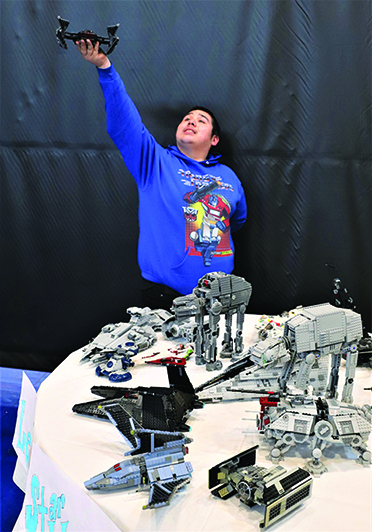
An additional, newly minted adult had his very own table as well. Pure heart icon Sean-Paul Mace displayed his LEGO Star Wars collection. He dazzled with his depths of dark side knowledge and could even tell you which cinematic scenes his figures could be found in.
“He’s been working on this particular collection for about a year,” said Sean-Paul’s mother, Veronica Iukes. “Tracking down each model needed to complete his collection has been quite the endeavor. From finding them online to visiting shops we’ve heard about to reaching out to private collectors, it’s been quite the journey. With his autism, we’ve found that building LEGO figures and other types of hands-on, highly focused needed activities has a calming effect. We love buying Sean-Paul LEGO sets because it’s therapeutic, like a form of medicine that settles him.”
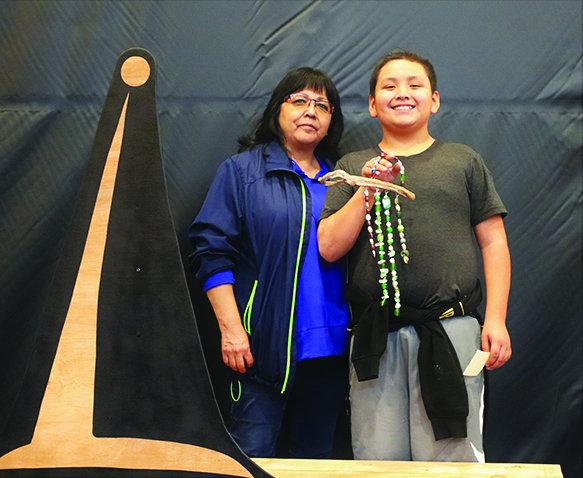
Interwoven through many of the thought-provoking youth creations were both subtle and not so subtle tie-ins to ongoing equality awareness campaigns, human rights issues and demands for social justice. From artistic renditions on the Missing and Murdered Indigenous Women’s crisis, to declarations of the Native-inspired rally cry Water Is Life, to a heartfelt poem by ballin’ with a braid all-star Charlie Contraro invoking the ancestral power of her body-length braid.
My hair connects me to my Ancestors; Like the roots of tree. My braid is the strong trunk; From where I gather my STRENGTH. I am my hair; And my hair is me. – Charlie
Whether it was from reading written words or interpreting the depths of color and images on display from our inspiring adolescent artists, a message being conveyed loud and clear is that yes, in fact, the youngest among us are paying attention to current events and understand how their shared culture is viewed nationally. More importantly, they are capable of channeling their traditional teachings and spiritual strength into pure artistry.

“When our kids create artwork for this event they are able to mix in elements of their personality, culture, family values, and what matters to them as individuals. It’s really incredible to see how even when there are twenty entries of the same type, each is different and unique in its own way because they reflect the artist who created it,” said Courtney Jefferson, Positive Youth Development Manager.
“Witnessing our kids get inspired from cultural pillars like Billy Frank Jr. is nice to see because that means they are learning about these foundational figures in school and retaining the information,” she added. “This proves how powerful it is to educate our people about our shared culture. Especially for the elementary aged children. It’s so important they learn about the legacy of those who came before us and made it possible for us to thrive today.”
Without a doubt, the 2023 Native American Art Festival showcased a wide-range of artistic skills among our Tulalip students. While once again confirming the limitless imagination of authentic Native art created by the next generation of emerging artists.
April 29, 2023 syəcəb
Please use the following link to download the April 29, 2023 issue of the syəcəb
Indian Boarding School survivors share heart breaking experiences of forced assimilation
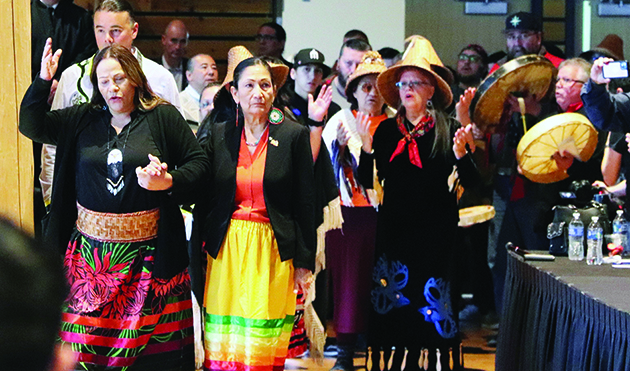
“We were all silenced. We don’t tell-all because we can’t tell all – because we might get a spanking. There was a lot of things I’ve seen, a lot of things I heard, a lot of things I don’t want to remember. We kept our secrets all this time. We don’t talk about it; we should talk about it. It’s okay to heal, we are not healed yet. I’m 99 years old and I’m still healing yet. It’s hard. It’s very hard.”
-Ernestine Lane, Lummi Nation
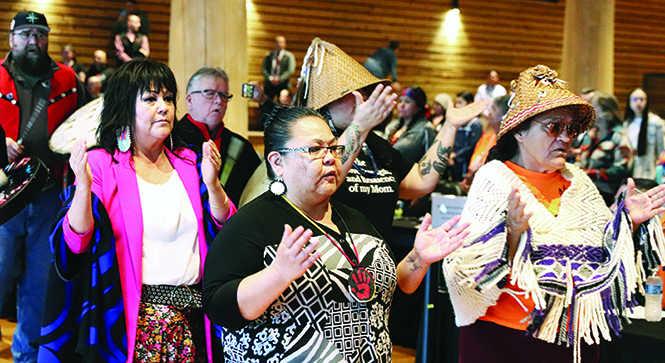
By Kalvin Valdillez, Tulalip News
In the late 1800’s, the US government made it their mission to erase the cultural identity of the Indigenous population by establishing boarding schools throughout the country. The official slogan for the Civilization Fund Act was ‘kill the Indian, save the man’. Children as young as three were forcibly removed from their families and tribes to attend these horrific assimilation academies. And if the children spoke their ancestral languages or practiced any of their traditions at the boarding schools, they were punished harshly and faced physical, emotional, and mental abuse. These institutes continued with these practices well into the sixth decade of the nineteenth century.
Resilient is a word that this current generation of Native people identify with because they are actively putting in work to revitalize and recover their languages, dances, songs, and traditional way of life. And after decades of attempts, from both religious and governmental institutions, at demonizing our people and practices, we are still here, and we are still standing strong.
Many of today’s Indigenous activists and cultural bearers are quick to credit the older generations who experienced the atrocities committed by the boarding schools, and who held strong and passed on their traditions to the next generations. For Tulalip, there are several prime examples of resilient tribal members who preserved the culture despite harsh assimilation efforts. One such individual is always held in high honor for the sacrifices she made to ensure that the history and traditions of the sduhubš people are accessible to their future generations for many years to come, and she is none other than Harriette Shelton-Dover.
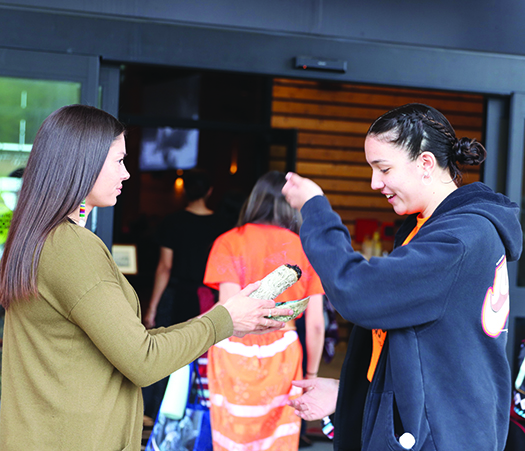
On the morning of April 23, the reason why many Coast Salish children bravely endured lashings, beatings, or solitary confinement, and the reason why many children were laid to rest at a young age, was on full display at the Tulalip Gathering Hall. The reason they made those sacrifices could be seen on the button-designed shawls and vests, the cedar-woven hats and headbands. Those sacrifices could be heard on the elk and deer skin hand drums, and in the voices of their descendants who utilized their ancestral language, in both song and prayer. The sacrifices were present in every dance step, in each bite of salmon during the lunch hour, and through the act of smudging with sage bundles every time someone walked through the doors of the Gathering Hall. Those sacrifices were made by young children who kept the cultural fire burning in the darkest of times.
The price those elders and ancestors paid did not end with corporal punishment at the boarding schools. Over time, due to the threat of those punishments, they learned to hold their emotions in, which resulted in heavy baggage that was also passed down their lineage. And though most boarding schools have been disestablished, the trauma wounds they caused are still very much exposed and present in every Native community throughout North America.
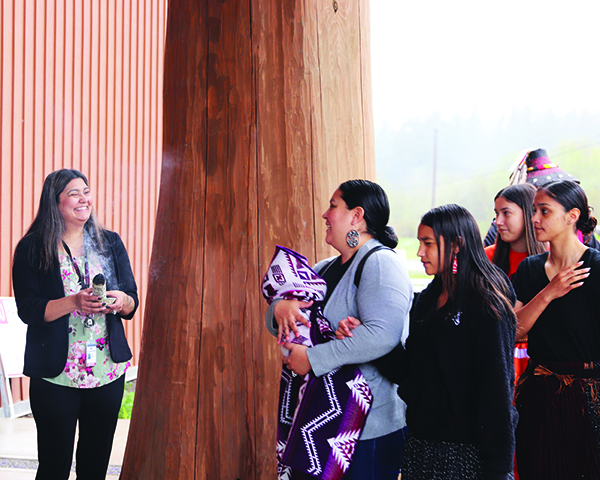
Until recent years, the history of Indian boarding schools remained widely unknown to the general population. The first step in healing those trauma wounds was simply making people aware of the damage caused and the lives lost during the boarding school era, as well as getting the federal government to acknowledge their role in the attempt of cultural genocide.
In 2021, the first Native American to serve as a US Cabinet Secretary, Deb Haaland (Laguna Pueblo), launched the Federal Indian Boarding School Initiative to investigate what took place at these schools by reviewing records and speaking to the tribal nations that were affected by Civilization Fund Act. The results of that investigation, released in May 2022, show that between the years of 1819 and 1969, the US operated or supported 408 boarding schools across 37 states, along with at least 53 burial sites for Indigenous children.
In the following months, Secretary of Interior Haaland and Bryan Newland (Bay Mills Indian Community), the Assistant Secretary of Indian Affairs, organized a yearlong journey across the nation, known as the Road to Healing Tour. The goal behind the tour is ‘to connect communities with trauma-informed support and facilitate collection of a permanent oral history’.
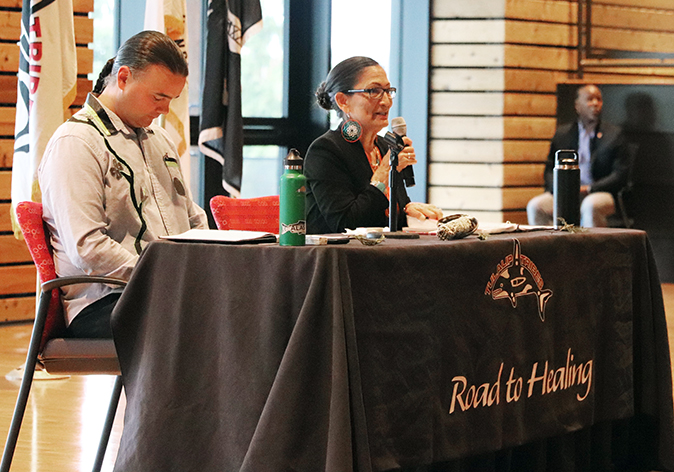
The Road to Healing made its sixth stop of the tour at the Tulalip Gathering Hall. In addition to the 200 or so tribal members in attendance, a group of professionals from Indian Health Services, whose expertise is in trauma-informed care, were at-hand to support the boarding school survivors and their decedents throughout the day.
Secretary Haaland was escorted to the front of the Gathering Hall by a group of Tulalip singers as they opened the ceremony with the sduhubš welcome song, also known as Harriette Shelton-Dover’s song. After blessing all four corners of the longhouse-style hall, cultural bearer Glen Gobin shared a brief history of boarding schools at Tulalip.
He shared, “There were three phases of the boarding school. Father Chirouse came shortly after the treaty signing, he set up a school at the mouth of Quil Ceda. Then he moved it down towards Priest Point and actually built a school there – that’s why it’s called Priest Point. And as our children passed away, he started a cemetery there also. I was doing research and I saw that my grandma’s sister, age 6, was one of those who died and is buried at that cemetery.
“And then, I believe it was in the late 1860’s, the Sisters of Providence petitioned the government to start a school. That school was across the bay where Mission Cemetery is today – and that’s why there is a cemetery there. As the children passed away, they were buried around the school grounds.
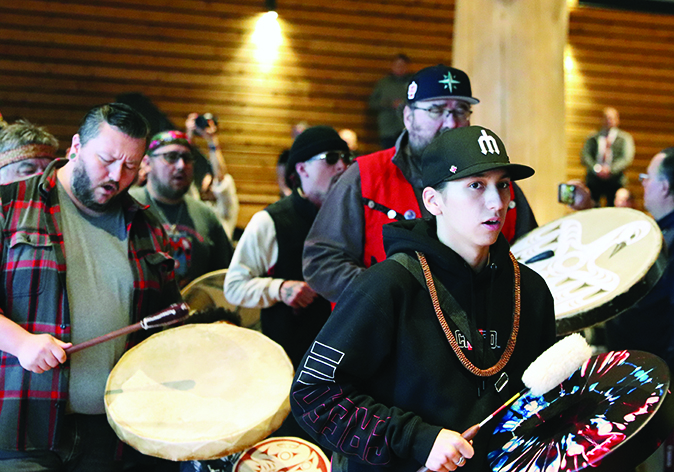
“That [school] burned down in the late 1800s and then the government took the program back and said, ‘we’re going to run this ourselves now’. And so, in the early 1900s, the boarding school was developed – that was ran like a military camp. And as we heard many of our elders talk throughout the years, what they knew, or witnessed, or what our grandparents told them – was about the constant marching, the constant inability to speak their language, the constant inability to see their family when they wanted to, because they were taken away and brought to the schools to civilize them.”
Following introductions by both Deb Haaland and Bryan Newland, they opened the floor for the survivors, and their descendants, to share how they were affected by the Indian boarding schools.
Virginia Bill, daughter of survivor Lottie Sampson (Swinomish/Upper Skagit) stated, “When she got here to Tulalip, she did talk of having to be marched everywhere. She talked about that bell that would ring. I think it was in the 1980s, we were brought here to a ceremony to commemorate that bell. I found my mom sitting alone by herself, and I asked her what she was thinking. She said, ‘Thank God, that silence. No more will that bell tell me where to go, where to be’. I read some documents that said they were going to make Tulalip the Carlisle of the Northwest. I read some of the official papers, where the former priest that was here referred to our families as savages. When you read those articles, it breaks your heart. There are no commemorative plaques, no ribbons, there are no stories telling us about the success of our mothers and fathers – there is no ‘congratulations, you made it’.”
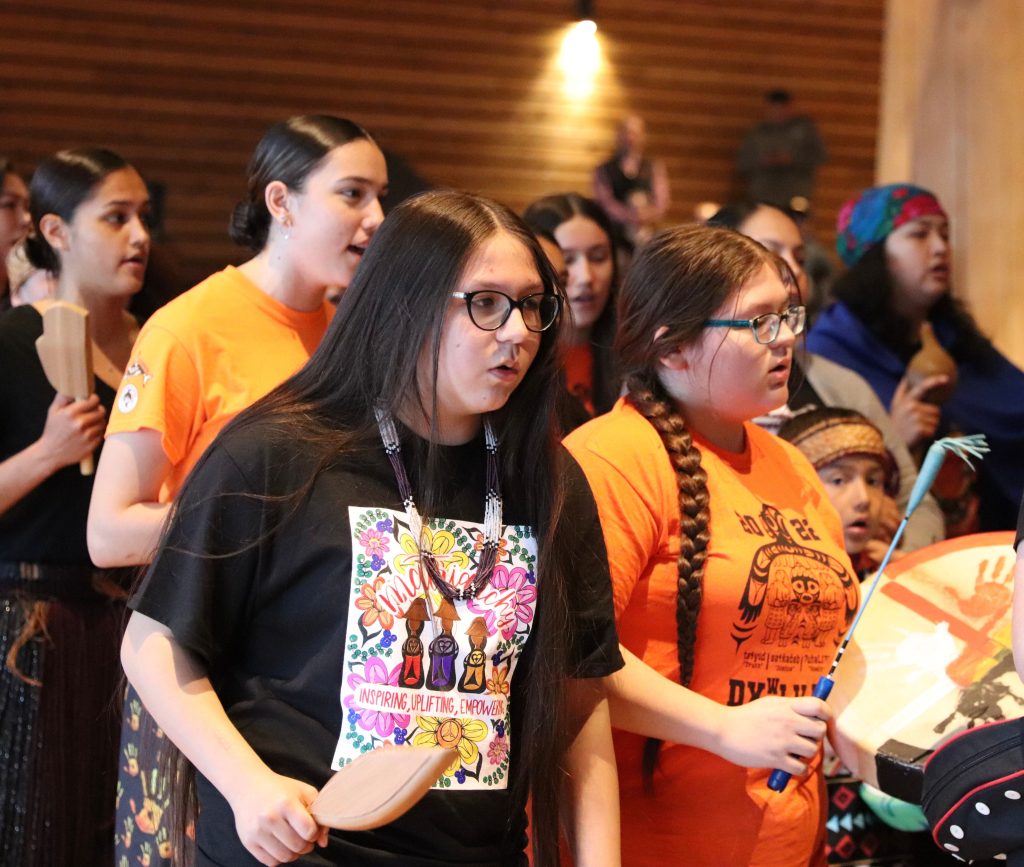
Boarding School survivor and Lummi tribal member, Jewell James, said, “My great-grandfather talked about how they would burn his tongue and torture him, and stick his tongue on frozen pipes outside during the winter every time he used his Lummi language. It was a real traumatic experience. My mother, when she was three, ended up at Cushman (Indian Hospital). And she battled with depression. There was no job or income or food on the reservation, so it was either Cushman or you starve. And she would always talk and cry about how at the age of three, they put her in the basement with the rats and blocked off all the lights. She’d always talk about how she had to hide in the corner and hope the rats didn’t get her.”
The tears were pouring as boarding school survivor Matthew War Bonnet Jr. (Lakota), recounted his boarding school experience. He said, “at nighttime, in the dormitories, the kids would cry because they were lonesome for their parents. Sometimes the priest who shared a little room off to the side, would get disturbed about that. He would come out with his belt, pick up a kid off the bed and whack them for crying. When you’re six years old and you see that, you get scared, you start holding things in.”
After about two hours and several testimonies, Haaland and Newland called for the first break, and a traditional Tulalip lunch was served to the people. During this time, they asked for all the media outlets to excuse themselves for the day. The following sessions provided the opportunity for more survivors to detail their experiences at the boarding schools, while delving deeper into topics that they were not comfortable sharing in front of the cameras. From what we gathered through social media, the event extended into the late Sunday evening. Important work took place, and the healing process began for many, as they opened up for the first time about the terrible things that occurred at the schools in a private and supportive setting.
Secretary Haaland expressed, “Your voices are important to me, and I thank you for your willingness to share your stories. Federal Indian Boarding School policies have touched every Indigenous person I know. Some are survivors, some are descendants, but we all carry this painful legacy in our hearts. Deeply ingrained in so many of us is the trauma that these policies in these places have inflicted. My ancestors and many of yours endured the horrors of Indian boarding school assimilation policies carried out by the same department that I now lead. This is the first time in history that the United States Cabinet Secretary comes to the table with the shared trauma – that is not lost on me. And I’m determined to use my position for the good of the people.”
She continued, “In Washington state alone, there were 15 boarding schools, leaving intergenerational impacts that persists in the communities represented here today. It is my department’s duty to address the shared trauma that so many of us carry. To do that, we need to tell our stories. Today is part of that journey – I want you all to know that I’m with you on this journey. I will listen, I will agree with you, I will weep, and I will feel your pain. As we mourn what we have lost, please know that we still have so much to gain. The healing that can help our communities will not be done overnight, but I believe very strongly that it will be done. This is one step among many that we’ll take together to strengthen and rebuild the bonds within Native communities that Federal Indian Boarding School policies set out to break. Those steps have the potential to alter the course of our future.”
April 22, 2023 syəcəb
Please follow the link for the April 22, 2023 issue of the syəcəb
Weaving together with Cedar Roses
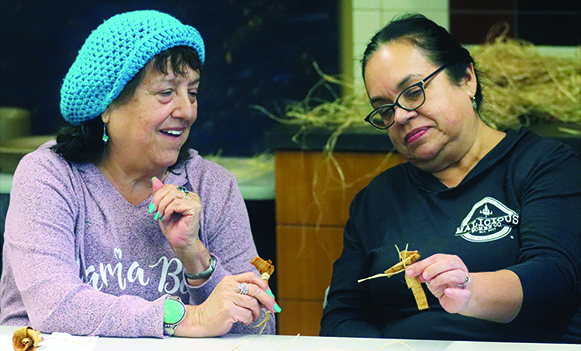
Indigenous Beginnings shares traditional teachings across multiple generations
By Micheal Rios, Tulalip News
When the Native-led, local nonprofit Indigenous Beginnings launched in July 2021, the mission was simple: to freely give and share traditional teachings through in-person, hands-on cultural workshops taught by inspirational knowledge keepers.
Created by Tulalip Court executive administrative assistant Stephanie Cultee, herself a Nooksack citizen and a dedicated employee of the Tulalip Tribes enterprise since 2008, Indigenous Beginnings has hosted 44 workshops thus far. Each intricately designed workshop is intended to help spread the cultural teachings of Coast Salish tribes, while sharing the diversity of knowledge from Native culture bearers in both urban and reservation-based settings.
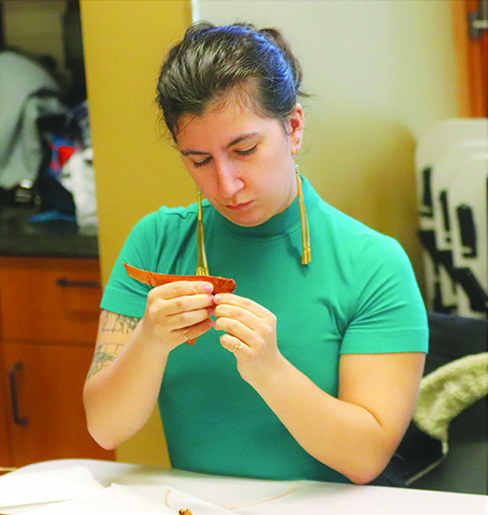
The culturally appropriate nonprofit continues to be dedicated to teaching tribal and nontribal participants how to sustainably harvest, prepare traditional foods, and how to weave, carve and otherwise transform natural resources into utility-filled items. Hosted events have included making delicious jelly from fireweed, harvesting devil’s club and mountain huckleberry, weaving cedar into baskets and headbands, carving canoe paddles, making traditional round drums, and even how to clean, fillet and smoke salmon. Workshops have primarily been led by Tulalip, Nooksack, Lummi and Quinault citizens.
“With Indigenous Beginnings, all of our workshops are for all ages,” explained Stephanie. “There was a whole generation that couldn’t practice or learn their ways from their grandparents because of the boarding school era. So for those older generations who want to learn, they can attend our workshops which is just as much designed for them as any adult or youth. This way we can not only keep our elders involved in their culture, but have them set that example for the young ones that it’s okay to ask questions and admit there’s always more to learn.
“I am from Nooksack and moved down here when I was 15-years-old,” she continued. “I have three daughters who are Tulalip, and I want them to learn their Tulalip heritage and Nooksack’s as well because they are descendants from Nooksack, too. I didn’t know much about my tribe, because I moved away when I was young, and I thought this could be a way that I could teach them the traditional ways of their people, while also learning myself.”
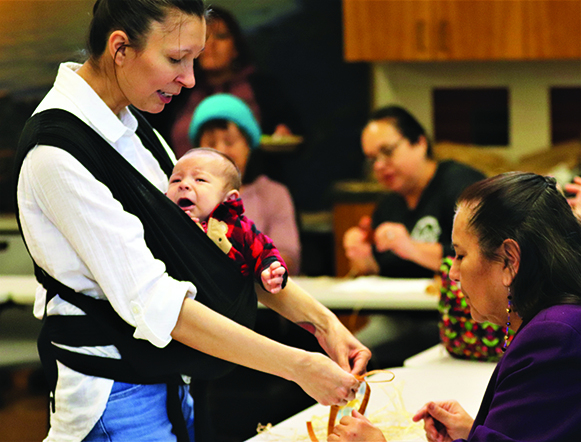
It was in that spirit of cultural understanding and community building that Indigenous Beginnings hosted an awe-inspiring workshop at the Hibulb Cultural Center centered on created cedar roses. Lushootseed teacher Maria Rios instructed the full classroom in the basics of cedar weaving 101, which included at times having her infant son Enzo harnessed belly side.
The diverse group of eager learners spanned multiple generations. They sat intently as Maria detailed how Coast Salish tribes believe the Creator gave their people cedar as a gift. Cedar was the perfect resource, providing tools, clothes, baskets and carvings in addition to having medicinal and spiritual purposes. After being harvested and stored for future use, the highly sought after golden inner bark is separated into strips and intricately shredded for weaving. The processed bark can then be used as a malleable material, similar to wool and other synthetic fibers, and crafted into baskets, clothing, or, as in this particular case, long-lasting roses.
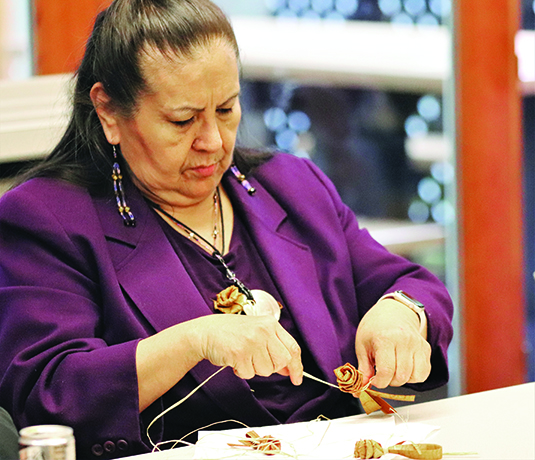
Among the workshop participants was Tulalip mother/daughter duo Carlotta and Cheylah. After receiving a few of the finer weaving pointers from Maria, they quickly found a groove and feverishly created a couple dozen cedar roses. Of course, in the traditional way, Carlotta gave away her first made rose to elder Rebecca Hunter.
“I’ve wanted to relearn how to make cedar roses for a long time now. I was originally taught by the late Tara Taylor over twenty years ago, but unfortunately I lost the teaching by not practicing enough,” shared Carlotta. “My daughter Cheylah is 13-years-old and kind of at the hardheaded phase, so I wasn’t sure if she’d want to come with me or not at first. But then she was so excited to join after I told her Miss Maria was the instructor. I’m so happy we got to participate and learn together. We had a lot of fun.”

The memorable afternoon was filled with a type of whimsical family bonding that was once common place among tribal villages. With babies, teenagers, adults, and elders all sharing in a unified experience of weaving with yellow cedar. Some for the first time. Others for the first time in a long time. And still others who had only dreamed of one day having the opportunity to create cedar roses in a similar fashion as their ancestors once did.
Such is the case with Seattle resident Shyanne Steele of the Colville Confederated Tribes. She shared having memories of being a little girl and watching her grandma, also a language teacher, weave all kinds of items. When she came across a flyer for the cedar rose workshop on Facebook she jumped at the opportunity at attend.
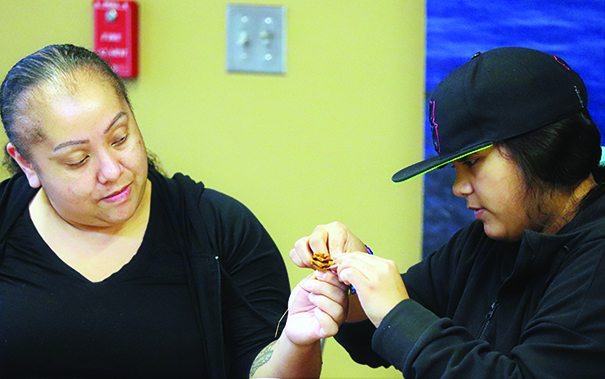
“Lately, I’ve been thinking a lot about how to get more connected with traditional art forms because it’s so difficult for me given my tribe is far away. Then, just a few nights ago, I actually dreamt about harvesting cedar,” said the 24-year-old University of Washington student. “Being able to attend and interact with so many welcoming tribal members here was amazing. It really grounded me to the teachings we have about cedar. Beyond being a super cool and strong material to work with, it’s been central to Indigenous life in this area for countless generations and really helps us connect with our ancestors.”
By bringing tribal citizens of different generations together in an atmosphere of learning and sharing, the Indigenous Beginnings cedar rose workshop allowed participants an opportunity to connect with Natives of neighboring tribes and form meaningful relationships based on shared interests and experiences.
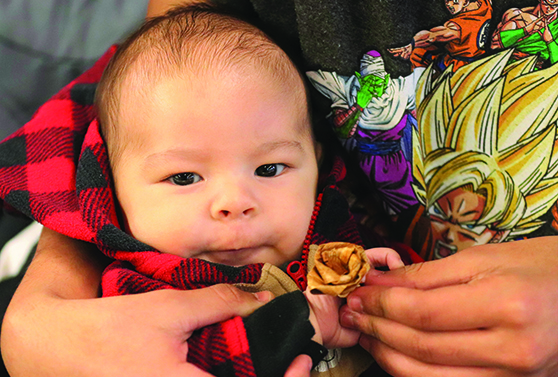
Whether it’s to learn new skills or refine existing ones, the active participation in our shared culture is how we help maintain a strong connection between the past, present, and future. Ensuring that important cultural knowledge and traditional knowhow is preserved and passed on to future generations.